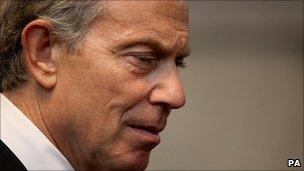Iraq inquiry: Why is Tony Blair being recalled?
- Published

Tony Blair's second appearance is likely to attract as much publicity as his first
It is not immediately obvious what questions the members of the Iraq Inquiry want to put to Tony Blair when he is recalled to give further evidence next month.
However, a significant number of key witnesses have appeared publicly before Sir John Chilcot's committee since last January, and more than 30 witnesses have also given evidence in private.
In his evidence at the beginning of this year, Mr Blair insisted he had no regrets about removing Saddam Hussein from power.
He mounted a robust defence of his decision to go to war, describing the former Iraqi leader as "a monster".
He made it clear he would have done it all again, had there been any possibility of Saddam Hussein developing weapons of mass destruction.
The committee may wish to question him further about the reliability of the intelligence in the build-up to war. In July, the former head of MI5, Baroness Eliza Manningham Buller, had cautioned against "an over-reliance on fragmentary intelligence".
In his evidence, the former UN weapons inspector Hans Blix, also expressed doubts about the intelligence. He was unequivocal in stating that the invasion of Iraq had been "an illegal war".
Clarification may also be sought on the legal advice given to Mr Blair's cabinet before the invasion by the then Attorney General, Lord Goldsmith.
The former International Development Secretary, Clare Short, told the inquiry that she thought there should have been a proper discussion among ministers. Lord Goldsmith has now been asked to present additional written evidence to the inquiry.
'More specific'
Professor Michael Clarke, Director of the Royal United Services Institute in London, says Mr Blair may be nervous about a second appearance as it appeared he was on the first occasion.
"A lot of testimony has raised questions about the generality of what he said the first time round, and in being required to be more specific about something that happened seven years ago, he may have some anxious moments," he says.
"Like all good historians, the committee wants to go back and revisit areas they don't feel they understand properly."
The Iraq Inquiry is keen to stress that its members have been "hard at work" since the public hearings in the summer.
There have been two visits to Iraq, a meeting with military veterans in the UK, and more than 30 submissions have been received from international lawyers.
However, until the evidence from its private hearings are made public, perhaps in the New Year, one can only speculate about the issues which the Chilcot inquiry still wants to explore.
- Published8 December 2010